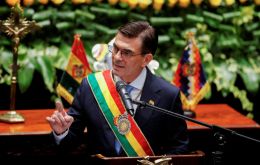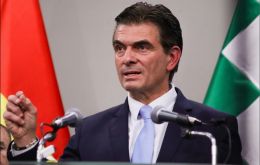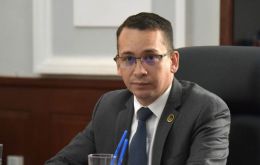MercoPress. South Atlantic News Agency
Tag: Bolivia
-
Saturday, February 28th 2026 - 01:13 UTC
Bolivia military plane carrying central bank cash crashes; crowd tries to grab banknotes

A Bolivian military Hercules C-130 transport aircraft suffered an accident on Friday afternoon in El Alto, the city adjacent to La Paz, leaving at least 15 people dead, according to a preliminary toll attributed to firefighters. The aircraft overran the runway and slid onto a main avenue, striking vehicles and triggering chaotic scenes as residents attempted to collect bundles of cash scattered across the crash area.
Add your comment! -
Friday, January 23rd 2026 - 22:55 UTC
Bolivia’s vice president points to Urubó as possible hideout for fugitive Uruguayan trafficker Marset

Bolivia’s Vice President Edmundo Lara said fugitive Uruguayan drug trafficker Sebastián Marset may be hiding in Urubó, an affluent residential area on the outskirts of Santa Cruz de la Sierra, and urged security forces and Interpol to carry out “urgent” raids to verify the lead. In a video posted on social media, Lara questioned why major operations had not been conducted in the area “for a long time,” suggesting a gap in enforcement that could be shielding the suspect.
-
Wednesday, January 7th 2026 - 10:12 UTC
Key IDB Chief's visit to Bolivia announced

Inter-American Development Bank (IDB) President Ilan Goldfajn is visiting Bolivia between Jan. 13 and 14, marking the first time in 15 years that someone in his position has become interested in the landlocked South American country, signaling a shift in international financial relations under the administration of President Rodrigo Paz Pereira.
-
Saturday, January 3rd 2026 - 08:44 UTC
Bolivian President to rule electronically from abroad

Bolivian President Rodrigo Paz Pereira issued Supreme Decree 5515, allowing him to exercise full constitutional powers through digital means and electronic signatures while outside the country. The move comes amid escalating nationwide protests over the so-called Gasolinazo (end of fuel subsidies resulting in price hikes) and a notorious rift between the head of State and Vice President Edmand Lara.
-
Wednesday, December 31st 2025 - 10:38 UTC
Bolivia lifts all fuel import restrictions

Bolivia's Hydrocarbons Ministry has announced a sweeping liberalization of the national fuel market, lifting long-standing import restrictions and implementing a zero Specific Consumption Tax (ICE) for private importers.
-
Saturday, December 20th 2025 - 10:26 UTC
Bolivia faces indefinite strike to protest end of fuel subsidies

Bolivia's powerful labor and transport unions confirmed they would launch an indefinite national strike starting Monday after President Rodrigo Paz Pereira vowed that Supreme Decree 5503, eliminating decades-old fuel subsidies, was a “non-negotiable” starting point for his administration.
-
Friday, December 19th 2025 - 21:34 UTC
Superflu makes it to Argentina and Brazil

Health authorities across South America are on high alert following the confirmed detection of the Influenza A (H3N2) “K subclade” in Argentina and Brazil. The variant, which has already triggered emergency protocols in Chile and Bolivia, is characterized by genetic mutations that may increase transmissibility, though experts emphasize it does not currently appear to be more lethal than standard flu strains.
-
Thursday, December 18th 2025 - 08:11 UTC
Bolivian President ends fuel subsidies, raises minimum wage

Bolivian President Rodrigo Paz Pereira has announced a drastic economic overhaul, declaring a state of “economic, financial, energetic, and social emergency,” which includes ending fuel subsidies that have been in place for over 20 years and implementing a significant increase in the minimum wage to offset the resulting inflation.
-
Monday, December 15th 2025 - 10:18 UTC
Bolivian Supreme Court CJ mugged while on vacation in Brazil

Bolivia's Supreme Court (TSJ) Chief Justice Romer Saucedo and his family were robbed on Dec. 6 while vacationing in Guarujá, on the coast of São Paulo, Brazil, it was reported this weekend in La Paz.
-
Wednesday, December 10th 2025 - 22:59 UTC
Former Bolivian President Arce arrested in corruption probe

Former Bolivian President Luis Arce Catacora was arrested in La Paz on Wednesday afternoon in connection with a major corruption case involving the now-defunct Indigenous Peoples Development Fund (Fondioc).
